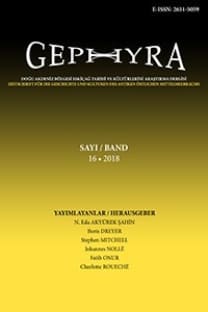Yukarı Menderes Vadisi'nde (Çal Ovası) Bulunan, Zeus Trossou Kültüne İlişkin Yeni bir Kamu Yazıtı
Makalede, Çal'ın kuzeyindeki Akkent kasabasında (Atyokhorion) bulunmuş olan ve Roma İmparatorluk Dönemi'ne tarihlenen yeni bir resmî yazıt incelenmektedir. Üst bölümü oldukça yıpranmış durumdaki bu Yunanca yazıtın okunabilen kısmında, Pl. Eukopos adındaki yerel bir hayırseverin yaptığı bağışlar kaydedilmektedir. Buna göre Eukopos, Zeus Trossou'ya boğa kurban edilmesi (bouthysia) ve rahiplerin kelle (bireysel) vergilerinin ödenmesi için 150 denarion bağış yapmıştı. Ancak bu masraflar sürekli olarak Eukopos'un bağışladığı paranın faizinden karşılanacak ve anapara Halk'a ait olacaktı. Yazıtın aşınmış olan üst bölümünde, Yaşlılar Meclisi'nin (gerousia) kontrolü altında sunulmuş olan adakların/bağışların bir listesi yer almaktaydı. Yazıtın çevirisi şöyledir: “ ... ve Yaşlılar Meclisi'nin denetimi altında bağışların bir listesi yapıldıktan sonra, bu listenin yazıldığı bir stelin Zeus Trossou Tapınağı'na dikilmesine (karar verildi). Aynı şekilde, Philodoksos oğlu Pl. Eukopos, hem Zeus'a boğa kurban edilmesi (bouthysia) ve hem de rahiplerin kelle (bireysel) vergilerinin ödenmesi için 150 denarion bağışlamıştır. Bu nedenle, halkın takdirini ifade etmek üzere kendisine çok daha büyük onurların verilmesine (karar verildi). Ayrıca, yukarıda da belirtildiği gibi, tüm masraflar bu paranın faizinden karşılanacak ve ana para Halk'a ait olacaktır”.
Anahtar Kelimeler:
Atyokhorion, hayırsever, bağış, Zeus Trossou, onurlandırma, gerousia, bouthysia, kelle vergisi, rahip, anapara, faiz
A New Attestation of the Cult of Zeus Trossou in a Public Inscription from the Upper Maeander River Valley (Çal Ovası)
This article contains the publication of a new public inscription from the village of Akkent north of Çal (ancient Atyochorion). The inscription dates from the Roman Imperial period and its upper half is heavily damaged. The remaining part of the inscription contains information about a local benefactor Pl. Eukopos, son of Philodoxos (?), who donated 150 denarii for the sacrifices of oxen to Zeus Trossou and for the payment of the priests' poll tax, under the condition that the expenses are perpetually defrayed from the interest, while the principal remains intact to the people. The lost part of the inscription contained a list of similar dedications/donations, erected under the supervision of the members of local gerousia.
Keywords:
Atyochorion, benefactor, donation, Zeus Trossou, honorary inscription, gerousia, bouthysia, poll tax, priests, capital, interest,
___
- E. Akıncı Öztürk – C. Tanrıver, New Katagraphai and Dedications from the Sanctuary of Apollon Lairbenos, EpigrAnat 41, 2008, 91-111.
- E. Bauer, Gerusien in den Poleis Kleinasiens in hellenistischer Zeit und der römischen Kaiserzeit, München 2014.
- K. Belke – N. Mersich, Phrygien und Pisidien, Wien 1990 [Tabula Imperii Byzantini, Band 7].
- P. A. Brunt, The Revenues of Rome, JRS 71, 1981, 161-172.
- M. Corbier, Cité, territoire et fiscalité, in: Epigrafia. Actes du colloque international en mémoire de Attilio Degrassi (Rome, 27-28 mai 1988), Rome 1991 (Collection de l'École française de Rome, 143), 629-665.
- S. Dmitriev, City Government in Hellenistic and Roman Asia Minor, Oxford 2005.
- Th. Drew-Bear, Local Cults in Graeco-Roman Phrygia, GRBS 17, 1976, 247-268.
- A. Geissen, The Coinage of Roman Egypt, in: W. E. Metcalf (ed.), The Oxford Handbook of Greek and Roman Coinage, Oxford 2012, 561-583
- L. Giannakopoulos, Ο θεσμὸς τῆς γεÏουσίας τῶν ἑλληνιστικών πόλεων κατὰ τοὺς Ρωμαικοὺς χÏόνους. ὈÏγάνωση καὶ λειτουÏγίες, Thessaloniki 2008.
- M. M. Šašel Kos, Inscriptiones Latinae in Graecia repertae, Additamenta ad CIL III, Faenza 1979.
- A. H. M. Jones, Taxation in Antiquity, in: A. H. M. Jones, The Roman Economy: Studies in Ancient Economic and Administrative History, ed. by P. A. Brunt, Oxford 1974, 150-186.
- L. Neesen, Untersuchungen zu den direkten Staatsabgaben der römischen Kaiserzeit (27 v. Chr.–284 n. Chr.), Bonn 1980.
- G. Petzl, Die Beichtinschriften Westkleinasiens, Bonn 1994 [EpigrAnat 22].
- D. Potter, The Roman Empire at Bay AD 180-395, London 2004.
- W. M. Ramsay, The Cities and Bishoprics of Phrygia, JHS 4, 1883, 370-436.
- W. M. Ramsay, The Cities and Bishoprics of Phrygia, Being an Essay of the Local History of Phrygia from the Earliest Times to the Turkish Conquest, Vol. I, Parts I–II, Oxford 1895–1897.
- M. Ricl – E. Akıncı Öztürk, A New Benefactor from the Upper Meander Valley (Çal Ovası), EpigrAnat 47, 2014, 16-20.
- T. Ritti – C. Şimşek – H. Yıldız, Dediche e καταγÏαφαί nel santuario di Apollo Lairbenos, EpigrAnat 32, 2000, 1-88.
- T. Ritti, Documenti epigrafici dalla regione di Hierapolis, EpigrAnat 34, 2002, 41-70.
- J. Robert – L. Robert, La Carie, II. Le Plateau de Tabai et ses environs, Paris 1954
- L. Robert, Villes d'Asie Mineure. Études de géographie ancienne, Paris 19622.
- P. Roesch, Études béotiennes, Paris 1982.
- A. Royer – H. Bahar, Astra en Isaurie, Anatolia Antiqua 19, 2011, 149-198.
- L. Zgusta, Kleinasiatische Ortsnamen, Heidelberg 1984.
- K. Zimmermann, La origine de la gérousie de l'époque impériale, in: M. Mayer – G. Baratta – A. Guzman Almagro (edd.), XII Congressus Internationalis Epigraphiae Graecae et Latinae (3-8 septembre 2002, Barcelona), Barcelone 2007, 1523-1528.
- A. Zuiderhoek, The politics of Munificence in the Roman Empire: Citizens, Elites and Benefactors in Asia Minor, Cambridge 2009.
- ISSN: 1309-3924
- Yayın Aralığı: Yılda 2 Sayı
- Başlangıç: 2004
- Yayıncı: Nalan Eda AKYÜREK ŞAHİN
Sayıdaki Diğer Makaleler
Stadiasmus Patarensis için Parerga (15): Kasaba Ovası Çevresinin Yol Ağı
Bir Hata ve Sonuçları: Side'li Marcellus, İmparator Hadrianus'un Özel Bir Hekimi ?
Roma Dönemi'nden Mühürlü Bir Pirinç Külçe Üzerine Yorumlar
Nagidos Arkaik, Klasik ve Hellenistik Dönem Mutfak ve Pişirim Kapları
Bursa Müzesi'nden İki Yeni Mezar Yazıtı
Delikanlılar Delikanlı Olur: Iasos'tan Agonistik Grafitiler
Kilikia Bölgesi'ndeki Tarsus Müzesi'nden Hellenistik ve Roma Dönemi Stelleri
Yukarı Menderes Vadisi'nde (Çal Ovası) Bulunan, Zeus Trossou Kültüne İlişkin Yeni bir Kamu Yazıtı
Esengül AKINCI ÖZTÜRK, Hasan BAYSAL, Marijana RİCL
